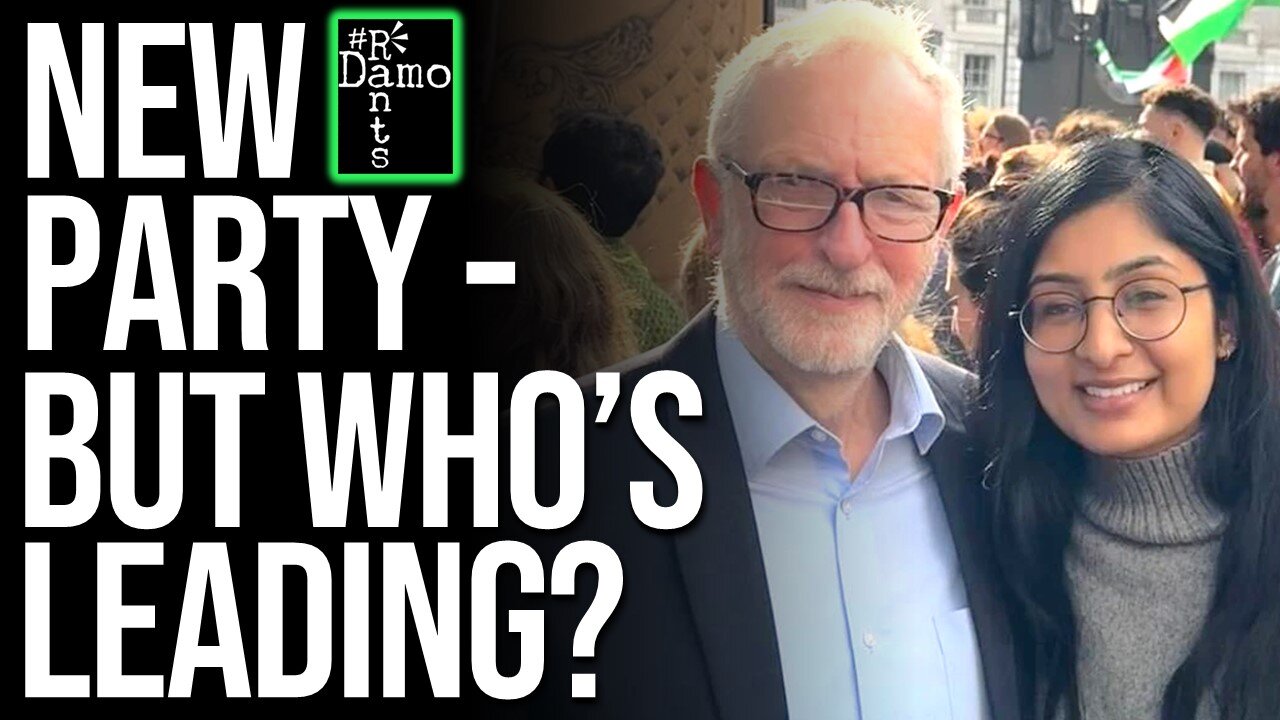Premium Only Content

New Party, Same Struggles: Can the Left Get It Right This Time?
Right, so in a political era where courage and conviction are in short supply to the point of virtual non existence, Zarah Sultana’s decision to resign from the Labour Party points to her at least having principles that showcase both of these. Yesterday, the Coventry South MP made headlines not just for her departure though, but for her announcement of the birth of a new political force, one she said she will be co-leading alongside former Labour leader Jeremy Corbyn. Whether or not all the pieces are yet in place though, the moment has ignited hope in thousands who have watched the Labour left be silenced, sidelined, and sacrificed and the years of talk of Corbyn starting a new party may be what we’re finally seeing.
Sultana’s resignation was long in the making. Having had the Labour whip withdrawn nearly a year ago after voting against the party line on welfare reforms, her decision is no sudden break but the culmination of an escalating ideological chasm between her and a Labour leadership under Keir Starmer that has veered increasingly rightwards, no longer resembling a Labour Party at all. Her departure is significant not just for its timing, but for the boldness of her claim: that a new party of the left is emerging, and she will help lead it. Yet, what should have been a powerful moment of rebellion against a rightward-lurching Labour machine has been somewhat complicated by one inconvenient point: Jeremy Corbyn himself has not yet confirmed his participation.
Right, so in a bit of drama last night, Zarah Sultana, MP for Coventry South, has officially resigned from the Labour Party, claiming she will co-lead a new left-wing political party with former Labour leader Jeremy Corbyn and frankly given how she’s been treated by her own party, who can blame her. The announcement has sent ripples across Britain’s political landscape, exposing deep fractures within the Labour movement, that are all on Starmer frankly yet still reigniting old debates about unity, ideology, and political strategy on the British left.
Sultana’s resignation has been long in the making. Having had the Labour whip withdrawn nearly a year ago after daring to vote against the party line over keeping kids in poverty by not lifting the two child benefit cap, her decision is no sudden break but the culmination of an escalating ideological chasm between her positions, challenging her own party leader more than many opposition MPs have, and that Labour leadership under Keir Starmer that has veered increasingly toward the Tories and Reform, as the increasingly unpopular Starmer chases votes still that he will never win.
To understand the significance of Sultana’s move, its worth asking why she left Labour at this particular moment. Her statement, issued upon resignation, outlined her disillusionment with a party she believes has
abandoned its core values. She said:
‘Today, after 14 years, I am resigning from the Labour Party.
Jeremy Corbyn and I will co-lead the founding of a new party, with other Independent MPs, campaigners and activists across the country.
Westminster is broken but the real crisis is deeper. Just 50 families now own more wealth than half the UK population. Poverty is growing, inequality is obscene and the two-party system offers nothing but managed decline and broken promises.
A year ago, I was suspended by the Labour Party for voting to abolish the two-child benefit cap and lift 400,000 children out of poverty. I’d do it again. I voted against scrapping winter fuel payments for pensioners. I’d do it again.
Now the government wants to make disabled people suffer; they just can’t decide how much.
Meanwhile, a billionaire backed grifter is leading the polls, because Labour has completely failed to improve people’s lives. And across the political establishment, from Farage to Starmer, they smear people of conscience trying to stop a genocide in Gaza as terrorists.
But the truth is clear: this government is an active participant in genocide. And the British people oppose it.
We are not going to take this anymore.
We’re not an island of strangers; we’re an island that’s suffering. We need homes and lives we can actually afford, not rip off bills we pay every month to a tiny elite bathing in cash. We need our money spent on public services, not forever wars.
In 2029, the choice will be stark: socialism or barbarism.
Billionaires already have three parties fighting for them. It’s time the rest of us had one.’
It’s a powerful statement. The same Labour Party that once championed anti-poverty and anti-racist values now, in her eyes as it is in the eyes of a great many of us, enables economic suffering at home and genocide abroad instead.
Sultana's rebellion on welfare legislation in 2024—voting against Starmer-backed cuts to child benefits and winter fuel payments—led to her suspension. But the root of her dissent lies deeper: in Starmer's repeated marginalisation of the Labour left, a political project that, under Corbyn, inspired a surge in party membership and grassroots activism. With the Gaza war as a flashpoint, Starmer’s reluctance to meaningfully condemn Israeli atrocities or support a ceasefire further alienated Sultana and a large portion of Labour’s base again and after Starmer’s assault on child poverty and then pensioners and now the disabled, well as the saying goes enough is enough it seems.
Her resignation, then, is not just a personal one, but goes to heart of what she believes in, what she joined Labour for, as so many of us did, and how the Labour Party has abandoned us, so becoming ever more Tory, we have not abandoned it. It is a loud indictment of Labour’s abandonment of its socialist principles and the suffocation of its left wing. That suffocation has included not just Sultana, but Jeremy Corbyn himself of course, who was barred from standing as a Labour candidate for so long, Starmer too afraid to expel him, until Corbyn himself finally gave him the opportunity by standing to defend his own seat that he’d held since 1983, as an Independent, against Starmer’s private health millionaire pick as the Labour candidate. Corbyn of course still won, to Starmer’s shame. Both Corbyn and now Sultana have become symbols of a broader betrayal by Starmer’s Labour—, that of Labour’s commitment of socialism, of internationalism, and of internal party democracy.
Yet if Labour's betrayal is damning, the left's response has not been without its flaws. Sultana’s declaration that she will co-lead a new party with Jeremy Corbyn was premature at best, and politically naive at worst. Despite much excitement trumpeting the formation of a new Corbyn-Sultana front, Corbyn has not formally committed to such a party. His language has remained cautious, vaguely affirming that he is in "discussions" and exploring the formation of a political alternative.
Reports suggest Corbyn was actually blindsided by the announcement, which was apparently released without his approval. According to journalist Gabriel Pogrund, Corbyn is said to be “furious and bewildered” at being named co-leader of a party that does not yet exist. Who in the Corbyn camp, is talking to a journalist who has been historically anti-Corbyn in Gabriel Pogrund for one? Someone clearly did didn’t they? But if true, this exposes a serious lack of coordination—and perhaps trust—between two of the most prominent figures on the British left, though Corbyn has stated they do work well together.
Yet still the obvious question then arises: is this really the launch of a genuine political party, or merely the theatrical posturing of a disaffected MP at this point? As of now, no party name has been announced, no manifesto published, no infrastructure revealed, nobody else has been named that is involved with it. There is no sign of broader consensus either: there is no electoral pact with the Greens for instance. Sultana’s statement was bold, but also vague. And the lack of detail invites scepticism and I don’t say that easily, I might be a Green now, but I’m formerly Corbynite Labour, I really would love to see some detail, some electoral pacts with other left leaning parties so that a united left takes on the billionaire backed parties and can win, instead of splitting that vote as the vagaries around this announcement invites accusations of.
While Sultana's political courage and dare I say enthusiasm are laudable, the disjointed nature of the announcement risks reinforcing the very narrative that mainstream media and the Labour right have always deployed against the left: that it is chaotic, divided, and unserious. Starmer’s rancid bunch calling themselves the grown ups in the room and all of that dross. The timing of the announcement, absent Corbyn’s confirmation, hands ammunition to those who wish to dismiss this effort as nothing more than the latest in a long line of failed leftist splinters.
But this is not just about optics. A fragmented left poses real strategic challenges. In a first-past-the-post electoral system, vote-splitting can be fatal. If Sultana’s new party cannot forge electoral pacts—particularly with the Green Party—it risks not only irrelevance but actively helping to return right-wing MPs in tightly contested seats. Without alliances, it becomes a protest vehicle and not a viable contender.
This raises another set of questions: What impact will this initiative have on the broader British left? Can it energise disillusioned voters who have turned away from Labour, or will it merely siphon off activist energy into another electoral cul-de-sac? The answer depends in part on whether this becomes a movement or a moment. If Sultana and her allies can build a real coalition—linking disaffected Labour voters, Greens, independents, and social movements—they might yet lay the foundations for a new left bloc. But if the left repeats its pattern of internecine division, this will become yet another footnote in British political history. I’d also argue why she needs Corbyn to co-lead this? Has he not done enough for the left? He’s now 76, she’s 31 – does he even want to go through this again? I won’t take anything away from Corbyn’s energy, but at what point do we on the left say we can’t keep turning to him?
We should also ask whether this reflects a deeper realignment. In truth, Starmer's Labour has long been alien to the generation of activists politicised by Corbynism, Palestine solidarity, Black Lives Matter, and climate justice. These movements demand transformation and Starmer just lurches from one brylcreemed borefest to another in every relaunch of his leadership he attempts. In resigning, Sultana may be voicing a generational revolt—one that sees the Labour Party as structurally incapable of delivering justice. In that sense, her decision may prove prophetic because Starmer ain’t turning things around.
Yet even prophets must build movements, not just declare them. Sultana’s announcement before the groundwork necessary for sustainable organising has been done – and obviously that must caveated against stuff happening behind the scenes we may not know about - but in naming herself co-leader before securing Corbyn’s agreement, does imply otherwise. Movements require more than declarations; they need trust, coordination, and strategy.
Looking forward, all eyes will be on Corbyn now though. Will he now publicly embrace Sultana's initiative, lending it the credibility and organisational gravity it currently lacks? For as much as I might bring up the issue of fairness for Corbyn to be a co-leader, doing so would quickly thrust this still unnamed still alleged party forwards. Or will he remain on the periphery, more comfortable with where he is in the here and now? There is an argument that without Corbyn, this party will struggle for visibility. With him, it’ll be thrust into the limelight, but will it come with the same issues that dogged his leadership of the Labour Party, especially if somebody is leaking stuff already to the likes of Gabriel Pogrund?
Sultana’s exit from Labour is ultimately a swipe across the bows for Keir Starmer and also a clarion call for justice. But justice demands not just outrage, but organisation. If this new project is to become more than a moment of defiance, it must build alliances, craft policy, and learn from past failures.
British socialism has always danced on the edge of renaissance and ruin, not helped by billionaire backed media looking for any opening they can exploit. Whether this latest rupture leads to regeneration or irrelevance will depend not just on passion, but on patience, discipline, and unity. Zarah Sultana has fired the starting pistol. But was it a false start or are the left actually going to come together and finish the race this time?
For as much as disability cuts might have been the last straw for Sultana, they might be the death knell for Keir Starmer too, forced to completely gut his Universal Credit and PIP Bill to just get it past second reading making it functionally pointless – pointlessly cruel for what is left in it, now saving no money at all. Get all the details of that story in this video recommendation here as your suggested next watch.
Please do also hit like, share and subscribe if you haven’t done so already so as to ensure you don’t miss out on all new daily content as well as spreading the word and helping to support the channel at the same time which is very much appreciated, holding power to account for ordinary working class people and I will hopefully catch you on the next vid. Cheers folks.
-
 2:01:30
2:01:30
BEK TV
4 days agoTrent Loos in the Morning - 9/2/2025
8.63K1 -
 10:47
10:47
Nikko Ortiz
19 hours ago15 Seconds Of Fame Gone WRONG...
124K14 -
 14:47
14:47
GritsGG
1 day agoRumble Tournament Dubular! Rebirth Island Custom Tournament!
83.9K5 -
 1:36:05
1:36:05
Side Scrollers Podcast
21 hours agoStreamer ATTACKS Men Then Cries Victim + Pronoun Rant Anniversary + More | Side Scrollers
93.5K13 -
 LIVE
LIVE
Lofi Girl
2 years agoSynthwave Radio 🌌 - beats to chill/game to
232 watching -
 42:55
42:55
Stephen Gardner
1 day ago🔥Trump’s SURPRISE Move STUNS Everyone - Democrats PANIC!
118K131 -
 1:37:19
1:37:19
Badlands Media
19 hours agoBaseless Conspiracies Ep. 148: The Delphi Murders – Secrets, Setups, and Cover-Ups
64.4K23 -
 5:59:05
5:59:05
SpartakusLIVE
13 hours ago#1 MACHINE Never Stops The GRIND || LAST Stream UNTIL Friday
165K5 -
 28:36
28:36
Afshin Rattansi's Going Underground
2 days agoDoug Bandow: ENORMOUS DAMAGE Done to US’ Reputation Over Gaza, Trump ‘Easily Manipulated’ by Israel
47.1K40 -
 2:45:13
2:45:13
Barry Cunningham
19 hours agoCBS CAUGHT AGAIN! CHICAGO A MESS! LISA COOK IS COOKED AND MORE LABOR DAY NEWS!
132K62